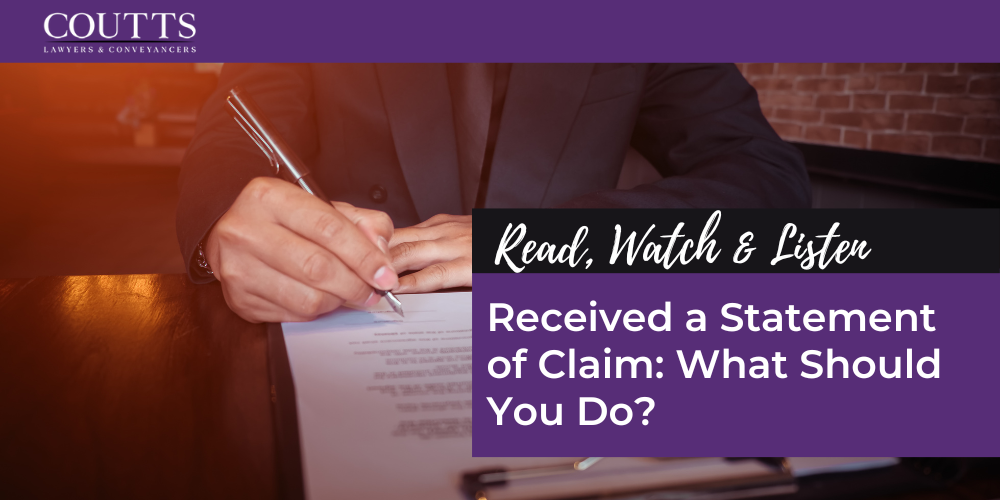KEY TAKE-OUTS:
- A statement of claim is a court document that commences proceedings in a court.
- If you disagree with the claim, you must provide a defence within 28 days.
- Where you agree with the claim, but cannot pay, try to negotiate a payment plan with the plaintiff.
A statement of claim is a document prepared by the person, or company, initiating the proceedings in a court. This means, once a statement of claim is filed, there are active court proceedings between the plaintiff and the defendant listed on the statement of claim. The statement of claim should plead the plaintiff’s claim (their case), which includes noting the events and particulars of the event. Generally speaking, and for example, in a debt recovery matter where someone has not paid an invoice, the statement of claim should note that there was an agreement as to fees, the services were provided, an invoice was issued and then the invoice has not been paid (and each relevant date of these events).
The statement of claim document is an extremely important document, legally speaking, as it (should) set out the legal basis of the claim. If the document fails to do this, the plaintiff is at risk of having the entire proceedings “struck out” from the court. As such, we highly recommend seeking legal advice and guidance as soon as possible, if you believe you have a valid legal claim.
What should you do if you receive a Statement of Claim?
-
If you do not agree with the claim, or only part, file a defence.
If you receive a statement of claim, you have to act quickly. This is due to the deadline that the receiving party of the statement of claim (being the defendant) having a period of 28 days to file a defence to the original claim. In this defence you would state that you either do not owe the money claimed or only part of it. If a defence is not filed within the 28 days, the plaintiff is entitled to make an application to the court for something court a “default judgment”, where the court will decide against you as you did not dispute the claim put before the court. It is difficult to ask the court to set a default judgment aside, and in doing so, you are required to show why the default judgment should be set aside, explain the delay in filing a defence, and further show that you have a defence. As such, we strongly recommend engaging legal advice as soon as possible to avoid missing any deadlines to file a defence.
The contents of a defence step out the defendant’s legal answer to the claim. It is a document that is just as important as the statement of claim – legally speaking – and as such we recommend seeking legal advice as soon as possible after receiving the statement of claim, to allow your lawyers time to consider your legal position and prepare the defence.
-
In instances of debt recovery matters, if you have already paid the claim, file a Notice of Payment.
If you did owe the money but have since paid the plaintiff, you need to notify the court through filing a Notice of Payment. Once a Notice of Payment is filed with the court, all case proceedings will stop.
-
If you agree you owe the money but cannot pay in full, negotiate with the plaintiff.
Where you know you owe the money to the plaintiff and you agree that you owe the entire amount claimed, but do not have the funds to pay the amount in full, you may be able to negotiate with the plaintiff to pay the amount in instalments.
Another option is to file for an acknowledgement of a liquidated claim and file an application to pay by instalments simultaneously. However, we recommend you always seek legal advice before proceeding down these routes.
-
If the plaintiff also owes you money, file a statement of cross-claim.
When you receive a statement of claim from a person who you believe owes you money in return, you are able to file a statement of cross-claim with your defence. This must be filed within 28 days and served to the plaintiff.
Further to this, there is another option called a right to “set-off”, which enables a defendant party to claim a reduction in what the plaintiff is claiming, due to monies owed to the defendant by the plaintiff.
Before filing a cross-claim, we recommend that you always seek legal advice, as a failure to prove your case could result in orders to pay the other party’s legal costs.
There are many avenues available to defendants when a statement of claim is received. The common denominator however is the requirement to file a defence within 28 of receiving the statement of claim. Lawyers require time to consider your legal position and the best option available to you. As such, we recommend seeking legal advice as urgently as possible, as soon as a statement of claim is received.
When seeking legal advice, you should be prepared to provide your lawyer with the following information:
- the statement of claim;
- information regarding the debt or goods claimed;
- information regarding whether the plaintiff owes you money or goods;
- your financial situation;
- whether you are willing to negotiate a settlement with the plaintiff; and
- any other information requested by your lawyer.
Coutts has a dispute resolution team that is dedicated to finding the right solution for you – and providing legal advice to you without the legal jargon with care, communication, and clarity. If you have received a statement of claim, or are considering starting one, please do not hesitate to reach out to one of our friendly dispute resolution team members for assistance and guidance.
For further information please don’t hesitate to contact:
This blog is merely general and non-specific information on the subject matter and is not and should not be considered or relied on as legal advice. Coutts is not responsible for any cost, expense, loss or liability whatsoever to this blog, including all or any reliance on this blog or use or application of this blog by you.



